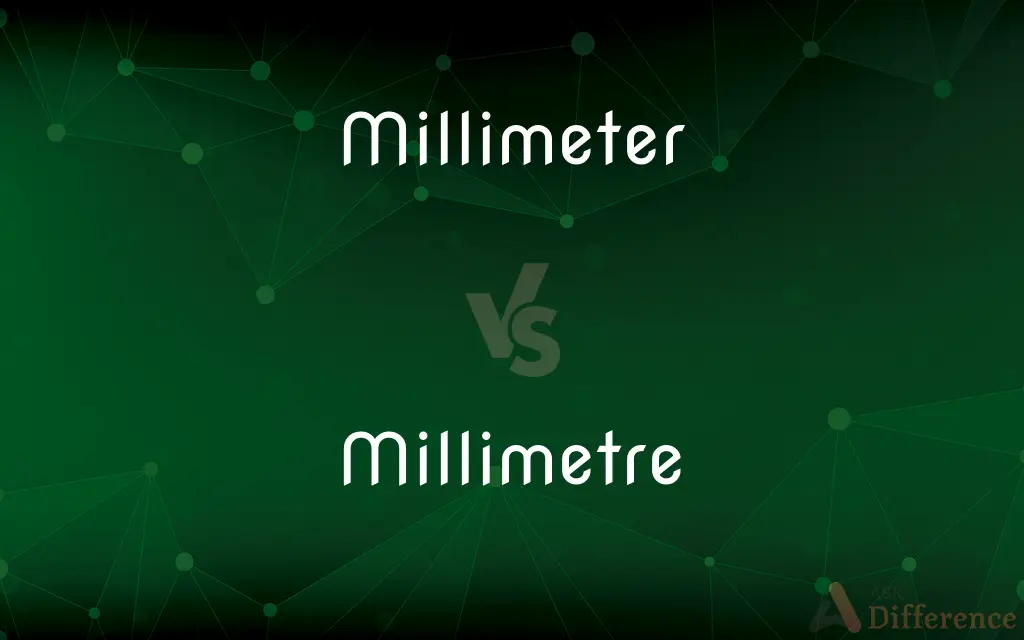Millimeter vs. Millimetre — What's the Difference?
By Urooj Arif & Maham Liaqat — Updated on April 2, 2024
Millimeter and millimetre refer to the same unit of length in the metric system, differing only in American vs. British spelling.

Difference Between Millimeter and Millimetre
Table of Contents
ADVERTISEMENT
Key Differences
The term "millimeter" is the American English spelling for a unit of length in the metric system, equivalent to one-thousandth of a meter. It is widely used in the United States for measurements in science, industry, and everyday life. On the other hand, "millimetre" represents the British English spelling of the same unit, preferred in countries using British English, such as the UK, Australia, and Canada. Both terms are correct and refer to the same measurement of length.
In terms of usage, "millimeter" is typically seen in scientific and technical documents, manufacturing specifications, and any context where precise measurements are required in American English-speaking regions. Conversely, "millimetre" is used in similar contexts within British English-speaking countries, adhering to their spelling conventions for words ending in "-meter."
While there is no difference in the unit's application or size, the choice between "millimeter" and "millimetre" often depends on the regional or national conventions of the English language being used. This distinction is similar to other differences in American and British spelling, such as "color" vs. "colour" or "fiber" vs. "fibre."
Educational materials, textbooks, and scientific publications usually adhere to the spelling preferred by their target audience's language variant. For instance, American schools and journals use "millimeter," whereas British and Commonwealth countries opt for "millimetre."
Regardless of the spelling, the abbreviation for millimeter/millimetre remains "mm" in both American and British English, simplifying international communication and documentation where precise measurements are essential.
ADVERTISEMENT
Comparison Chart
Spelling
American English spelling.
British English spelling.
Usage
Used in the United States and regions following American English.
Used in the UK, Canada, Australia, and regions following British English.
Application
Measurements in science, industry, and everyday life.
Same as millimeter, with spelling adapted to British English.
Language Preference
Preferred in American English.
Preferred in British English.
Abbreviation
"mm" in both American and British English.
Same as millimeter.
Compare with Definitions
Millimeter
A unit of length in the metric system.
The device measures thickness in millimeters.
Millimetre
Same metric unit as millimeter, with British spelling.
The jewellery piece was 10 millimetres in diameter.
Millimeter
Often used in everyday contexts.
The gap must be less than 5 millimeters wide.
Millimetre
Adheres to British spelling conventions.
The scientific study reported distances in millimetres.
Millimeter
Used for precise measurements in various fields.
Engineers require dimensions in millimeters for accuracy.
Millimetre
Utilized in daily life in the UK and Commonwealth.
He measured the fabric in millimetres to ensure accuracy.
Millimeter
Common in scientific research.
The lab report specified cell sizes in millimeters.
Millimetre
Applied in contexts requiring precise measurement, under British English norms.
The architect drafted the plans with all dimensions in millimetres.
Millimeter
Part of the International System of Units.
Millimeters are a standard unit for measuring rainfall.
Millimetre
Used in educational materials in British English-speaking countries.
Students were taught to convert centimetres to millimetres.
Millimeter
A unit of length equal to one thousandth (10-3) of a meter, or 0.0394 inch. See Table at measurement.
Millimetre
The millimetre (international spelling; SI unit symbol mm) or millimeter (American spelling) is a unit of length in the metric system, equal to one thousandth of a metre, which is the SI base unit of length. Therefore, there are one thousand millimetres in a metre.
Millimeter
Alternative spelling of millimetre
Millimetre
An SI/MKS unit of measure, the length of 1000 of a metre. Symbol: mm
Millimeter
A lineal measure in the metric system, containing the thousandth part of a meter; equal to .03937 of an inch. See 3d Meter.
Millimetre
A metric unit of length equal to one thousandth of a meter
Millimeter
A metric unit of length equal to one thousandth of a meter
Common Curiosities
What is the difference between millimeter and millimetre?
The difference lies solely in the spelling; "millimeter" is American English, while "millimetre" is British English.
Is there a difference in measurement between the two?
No, both terms refer to the same unit of measurement, equivalent to one-thousandth of a meter.
Which spelling should I use?
The spelling you should use depends on your regional or national version of English. Use "millimeter" in American English contexts and "millimetre" in British English contexts.
Can the two terms be used interchangeably?
While they can be used interchangeably in the context of the measurement they refer to, the choice of spelling should match the language variant being used.
Why are there two spellings for the same measurement?
The dual spelling reflects the broader differences between American and British English spelling conventions.
Is one spelling more correct than the other?
Neither spelling is more correct; the preference depends on the variant of English being used.
How do education systems in different countries teach this unit?
Education systems teach the spelling that corresponds with the national variant of English, along with the consistent use of the metric system.
Are there differences in usage of millimeter/millimetre in industries?
Industries follow the spelling preferred by their regional or national language norms but universally understand the measurement.
How is the abbreviation for millimeter/millimetre represented?
The abbreviation is "mm" for both spellings, facilitating universal understanding and use.
Are there other units of measurement with similar spelling variations?
Yes, other units like "meter/metre" and "liter/litre" also have American and British English spellings.
Does the choice of spelling affect scientific research or international collaboration?
No, the scientific community and international standards use "mm" as a common abbreviation, ensuring clarity and consistency.
How do online platforms handle the two spellings?
Online platforms, especially those offering international services, may recognize and accommodate both spellings.
Do scientific communities prefer one spelling over the other?
Scientific communities tend to use the spelling consistent with the language variant of their country or publication standards.
Can the spelling influence the interpretation of technical documents?
While spelling doesn't change the technical interpretation, using the correct variant for the audience can affect the document's perceived accuracy and professionalism.
Why is it important to maintain consistency in spelling?
Consistency in spelling within a document or publication ensures clarity and professionalism, respecting language norms.
Share Your Discovery

Previous Comparison
Cartridge vs. Cassette
Next Comparison
Cage vs. UncagedAuthor Spotlight
Written by
Urooj ArifUrooj is a skilled content writer at Ask Difference, known for her exceptional ability to simplify complex topics into engaging and informative content. With a passion for research and a flair for clear, concise writing, she consistently delivers articles that resonate with our diverse audience.
Co-written by
Maham Liaqat













































